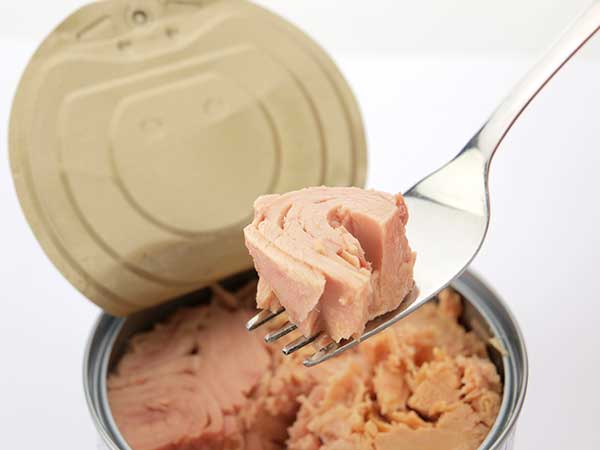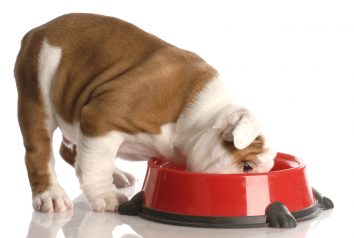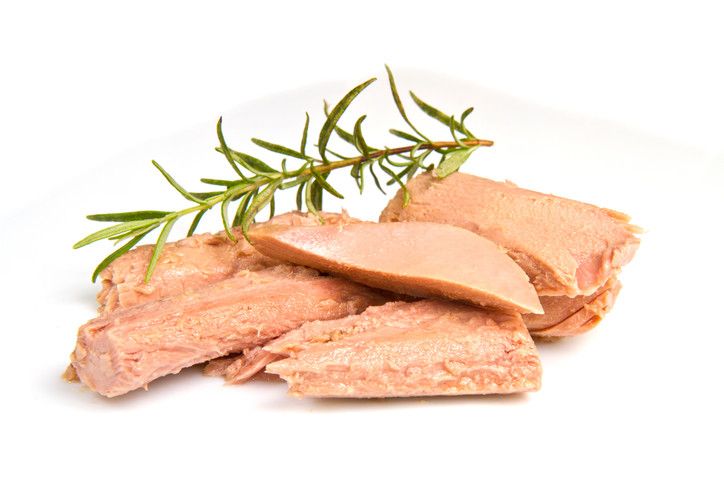When we think of protein sources for dogs, meat and poultry tend to be on the list because they are the more natural, accessible options for our pets. What dog doesn’t love a good bit of chicken?
While these food sources are great, it can be beneficial to mix things up with some fish every now and then because of the great taste and health benefits.
The problem for some dog owners is that they are not too sure what fish to feed them.
Can dogs eat tuna fish? The obvious answer may appear to be yes – as it is a common food stuff and an ingredient in some dog food – but there are different views on the subject.
For some tuna fish is a great food source when handled correctly; for others, the risks are just too great.
In this guide to tuna for dogs, we will look at some of the important issues surrounding canned and fresh tuna to determine whether or not either form of the fish is safe for your dog to eat.
As canned tuna is the biggest concern for many dog owners, we will start by looking at the safety implications of some of these products. From there, we will look at the pros and cons of fresh tuna.
Once the two sides have been discussed, we can then provide a more informed conclusion to advise you on the best approach for giving this fish to dogs.
Before that, let’s look at some of the potential health benefits of eating fish.
Giving dogs fish for protein and good health
When considering the question of is tuna good for dogs, it is important to remember that fish can be a great food source in a dog’s diet and a great way of adding some diversity to the menu.
A healthy diet for dogs is made up of lots of different ingredients and nutrients to build strong bones, organs, cognitive skills and generally help them to live a long and healthy life.
Dogs need plenty of protein to build muscles, the right fats – such as omega fatty acids – and all the right vitamins and minerals.
Fish like tuna can contain high levels of potassium, selenium, phosphorus, magnesium and plenty of B vitamins.
Fish oils can have a massive impact on well-being, conditioning and the cognitive function of dogs, but is there a reason why many dog owners turn to supplementation over real fish? With this in mind, owners are left considering whether tuna is bad for dogs and if their dogs can eat canned tuna as an alternative?
- Contains 1- 12 Lb. Bag of Canidae PURE Salmon and Sweet Potato Recipe Dry Dog Food
- Real food ingredients for the taste your dog will love. Crafted with real salmon as the first ingredient, paired with whole ingredients like menhaden…
- Complete and balanced goodness for adult dogs. This recipe is made using 10 or fewer key ingredients that are easily recognizable, perfect for…
Last update on 2025-01-03 / Affiliate links / Images from Amazon Product Advertising API
Can dogs have canned tuna? The health issues surrounding tinned tuna fish for dogs
Many dog food brands have fish based products in their ranges, often with salmon or wild-caught white fish.
The question on the minds of many dog owners is whether or not tuna is an acceptable form and if they can use it in a homemade diet.
Let’s start by separating the products. There is fresh fish from the fishmonger or store that has simply been cleaned, filleted and refrigerated. Then there is the canned, preserved stuff that we keep in the cupboard.
Naturally, many pet owners tend to favor these fresh fish in principle because it seems to be the healthiest option, but there is no disputing that the tinned tuna is more accessible and affordable. We, as humans, can eat the tinned tuna with no ill effects on a regular basis so why not feed it to dogs?

One of the biggest questions for dog owners is “can my dog eat tuna in brine?”
Should brine be avoided and which of these different juices and preservative agents are actually safe for dogs to eat?
The biggest issue with canned tuna is the concern that it is not so much about the fish but the way that it is processed, packaged and preserved.
The big issue here is the brine, oil or other form of juice or sauce that is used to preserve the fish in the tins.
Let’s start with the brine. While some see that as being better than sauce or oil, this salt water has a high sodium content and as much as you try to drain all the liquid away when serving the fish, these minerals could still leach into the food and have a negative effect on the health of your pet.
Sodium can can lead to pancreatitis and excessive thirst. This in turn leads to excessive water consumption that can lead to bloating and stomach twisting.
The alternative here would be to opt for a version with a simple spring water solution instead of brine because this immediately decreases the salt.
There are lots of different versions of canned tuna that may appear to be healthier than the brine versions, but there should also be avoided.
This includes tuna in oil, tuna in tomato sauces – as tomato can be toxic to dogs – and tuna in any other solution where you are unsure of the ingredients.
The simpler the canned tuna is, the healthier it will be.
- Works as a dog food topper – For pet parents looking for an alternative to capsules, raw treats, or soft chews, all it takes is a few pumps of Salmon…
- A tasty & body nourishing treat for cats & dogs – Essential fatty acids for a healthy coat.
- Powerful Omega Fatty Acids – This premium fish oil liquid formula is loaded with the healthy Omega-3 fatty acid (with epa and dha) to support health…
Last update on 2025-01-15 / Affiliate links / Images from Amazon Product Advertising API
Is tuna bad for dogs? Even the fresh stuff?
If you do decide to stop giving your pet tuna from a can, but don’t want to deprive them of the taste, fresh tuna may seem like the only way to go.
The problem here is that there are conflicting opinions on the subject. Some people believe that this form of tuna is safe in small doses, while other say that it should be avoided altogether in favor of other types of fish.
This issue all comes down to the presence of mercury in the flesh. These heavy metals can build up on long-lived fish like tuna and swordfish and could pose a risk to a dog’s health over time.
Fresh tuna can provide plenty of helpful nutrients for canine health but it also seems to come with a number of risks.
You should also be aware to deal with the bones in a responsible manner. Fish bones are a potentially dangerous choking hazards for any individual so don’t run the risk of one getting caught in your own pet’s throat.
Another issue, although less important, is that tuna can get stuck in the teeth of dogs a bit too easily. If the pieces go unnoticed and their teeth aren’t regularly cleaned, it could lead to bad breath and other issues.

Can puppies eat tuna?
Another important question that dog owners ask when considering the implications of can dogs have tuna is if it is safe for puppies.
With all the uncertainties mentioned above regarding the potential for mercury and sodium, and the high protein levels, it is probably best not to give puppies fish – especially fresh fish – when over puppy formulas are better suited to their needs. The issue of small fish bones is also a bigger concern when feeding these tiny pups.
ALSO READ: Can Dogs Eat Salmon? Good Or Bad for Dogs?
Canned tuna for dogs vs fresh tuna for dogs: should you choose one over the other?
Some vets and dog owners would say that it is best to avoid tuna altogether – whether fresh or canned – and to look at serving short-lived white fish that have the same fatty acids, protein and minerals, but less of the heavy metals and other issues.
This may explain why pet food makers tend to turn to other fish in their recipes than tuna.
As you can see, tuna has its place in the diet of dogs but you do have to be careful about how you prepare it and where it comes from.
Dog owners that give their pet canned tuna would say that there is no problem in giving your pet this product in moderation, but it might be best to leave the canned products alone entirely and focus on small amounts of fresh fish or dog food with fish included in the ingredients list.
At least this way you know that the meal is free from dangerous additives and preservatives and contains wholesome fish pieces.
Can I feed my dog tuna fish? (Conclusion)
The simple answer here is yes, but it is best if used in moderation and some pet owners may be more comfortable avoiding this option altogether.
The answer to the questions of is canned tuna good for dogs and is tuna safe for dogs are answered with so many ifs and buts to the responses, and such a mixed opinion, that you may choose to stay cautious and stick with other fish that are known to be safer.
If your dog likes the taste of tuna and you want to keep feeding it to them, make sure that you follow the advice of this guide on can dogs eat tuna fish.
If you want to give them canned tuna, make sure that it is in water rather than oil or sauce and to provide it in moderation.
If you want to offer fresh tuna, moderation is again highly important because of the metal contents and you also need to watch out for bones.
If you are unsure about sourcing and preparing this fish, turn to a reliable food brand that uses tuna in their formula or stick with a different fish.

Checkout Our Favorite Dog Products
1. BEST PUPPY TOY
We Like: Snuggle Behavior Toy with Heart Beat & Heat Pack – Ideal toy for new puppies.
2. BEST DOG TRAINING PROGRAM
We Like: Doggy Dan The Online Dog Trainer – Stop any dog problem and raise the perfect puppy with The Online Dog Trainer.
3. BEST FOOD FOR DOGS AND PUPPIES
We Like: Victor Super Premium Pet Food – Ideal for growing puppies and pregnant or lactating females. Also provides sustained energy for sporting dogs and dogs with high physical demands.
4. BEST DOG DNA TEST
We Like: Embark Dog DNA Test – Embark screens for over 250 dog breeds + tests for 170+ genetic diseases including MDR1 drug sensitivity, glaucoma, degenerative myelopathy, and dilated cardiomyopathy, some of the most common adult-onset diseases in dogs.
5. BEST DOG PUZZLE TOY
We Like: Outward Hound Interactive Puzzle Toy – Every dog loves chasing squirrels at the park. The Outward Hound Hide-a-Squirrel Puzzle Toy gives your dog the same feeling as though he was outdoors chasing live squirrels.
6. Best Calming Treats for Dogs
We Like: FurroLandia Hemp Calming Treats – These soft chews will calm your dog so it can peacefully endure stressful situations, such as long car trips, visiting unfamiliar places, or hearing Thunder. Ideal for all dog breeds & sizes.





